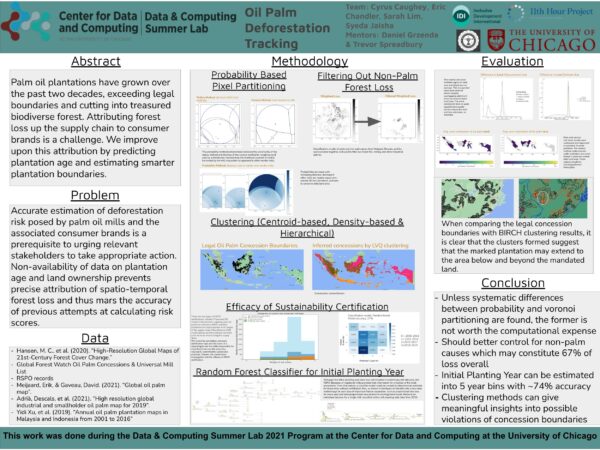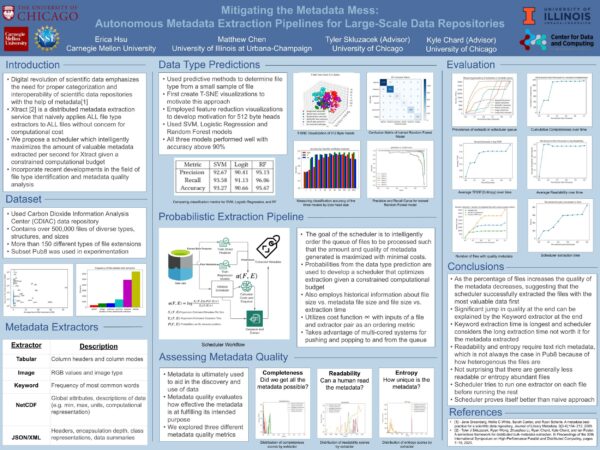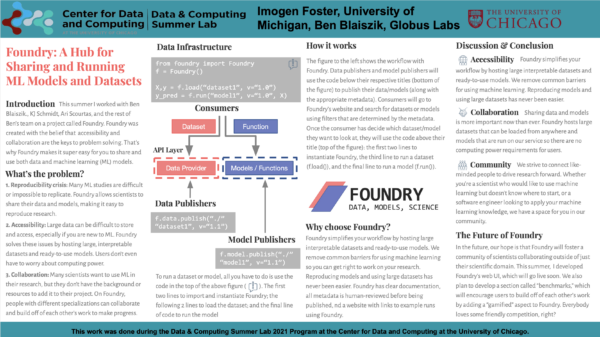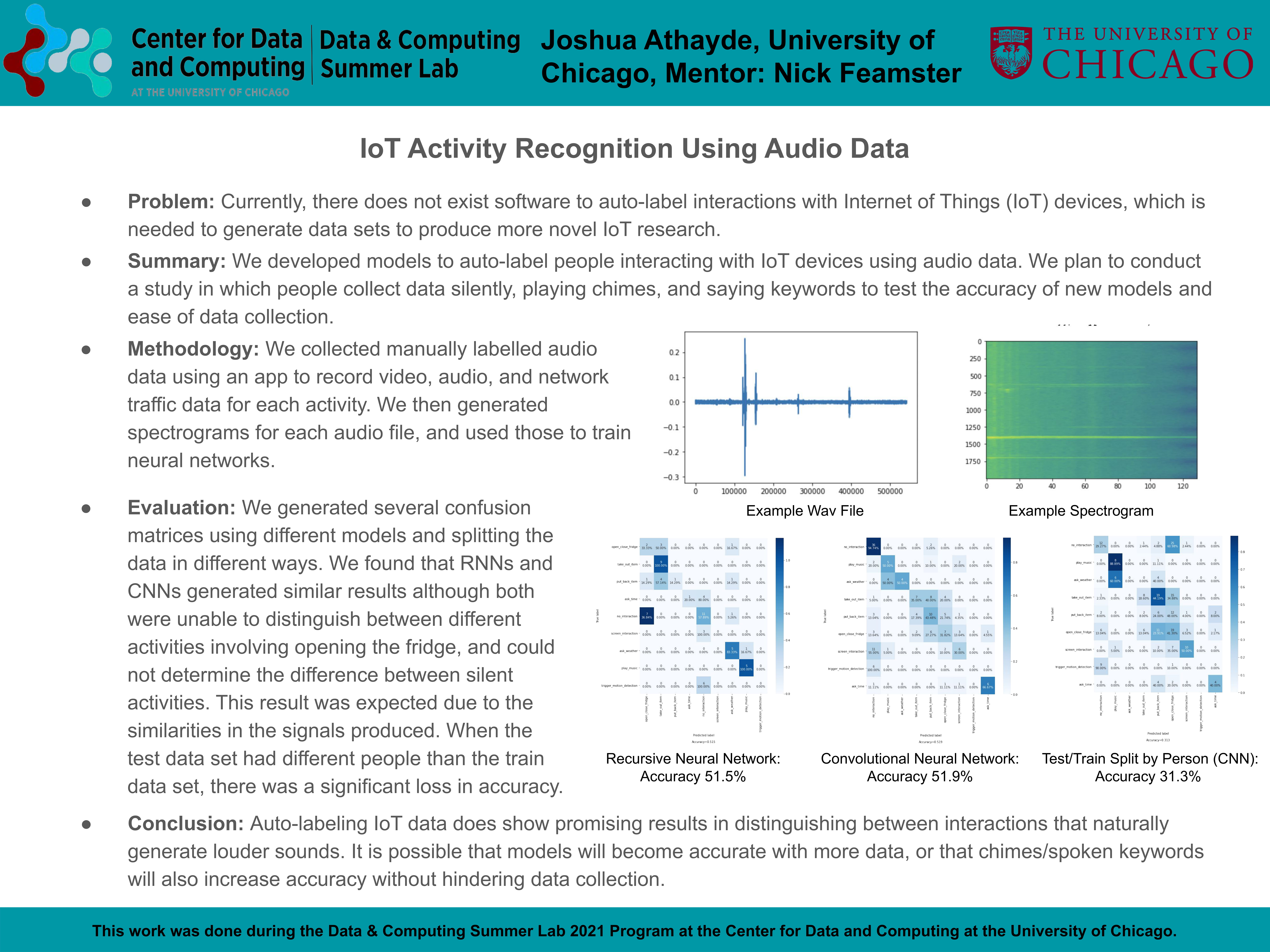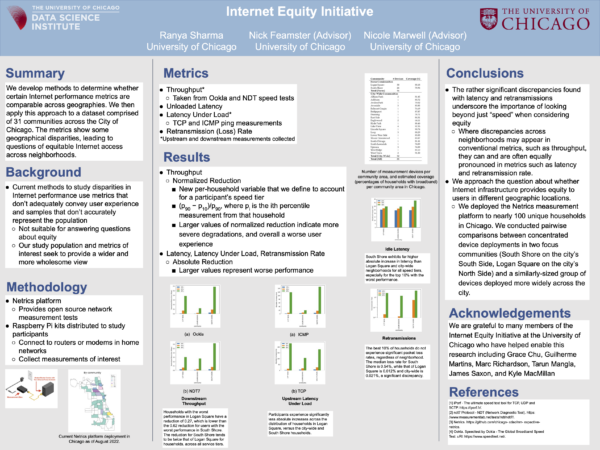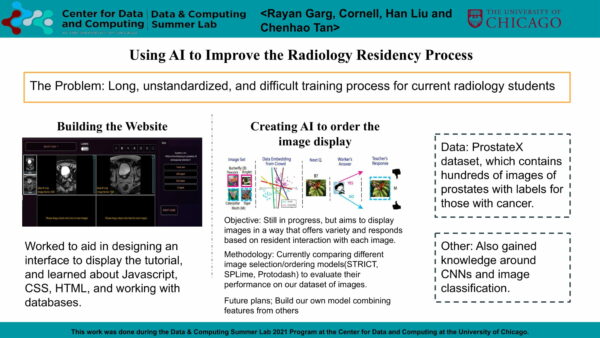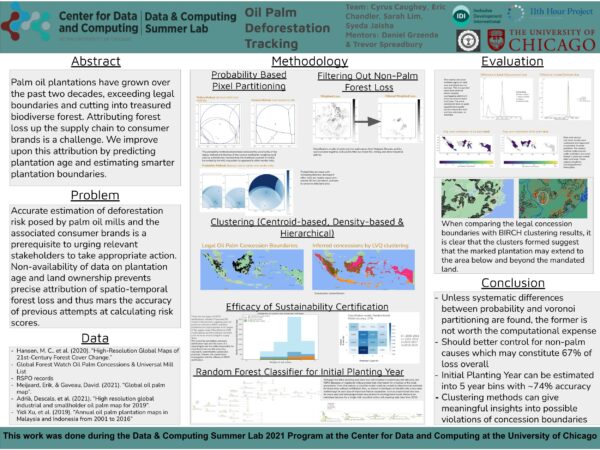2021 Project Profiles
2021 Program Cohort
-
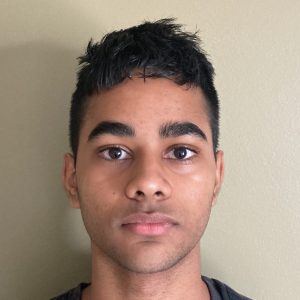
Akshat Gupta
High Schooler, Illinois Mathematics and Science Academy -

Alexis Vitiello
Undergraduate, The University of Chicago -

Alma Gashi
Undergraduate, Minerva University -

Annie Ma
Undergraduate, The University of Chicago -

Ava Bartolome
Undergraduate, Clark University -

Ayah Ahmad
Undergraduate, University of California, Berkeley -

Ayush Raj
High Schooler, Saint Francis High School -

Chimaobi Amanchukwu
DSI Summer Lab Alum; Undergraduate, The University of Chicago (Formerly: High Schooler, George Bush High School) -

Cole Bryant
Masters Student, Masters Program in Computer Science, The University of Chicago -

Cyrus Caughey
Undergraduate, The University of Chicago -

Daniel Chechelnitsky
Undergraduate, Macalester College -
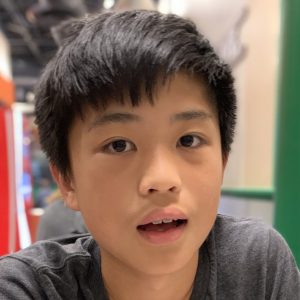
Daniel Xie
High Schooler, Coppell High School -

Danielle Allen
Masters Student, Masters Program in Computer Science, The University of Chicago -

Efraim Dahl
Undergraduate, The University of Chicago -

Eric Chandler
Masters Student, Masters Program in Computational Analysis and Public Policy, The University of Chicago -

Eric Yoon
High Schooler, Harvard-Westlake School -

Erica Hsu
Undergraduate, Carnegie Mellon University -

Eva Haque
Undergraduate, The University of Chicago -

Hoang Pham
Undergraduate, The University of Chicago -

Ian Yuen
Masters Student, Masters Program in Computer Science, The University of Chicago -

Imogen Foster
Undergraduate, University of Michigan -

Isaac Darling
Undergraduate, University of Chicago (Formerly: High Schooler, Jones College Prep) -

Isabele Vitório
DSI Summer Lab Alum; Undergraduate, Minerva University -

Jackson Brouwer
Undergraduate, The University of Chicago -
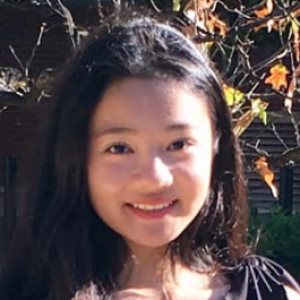
Jacqueline Chen
Undergraduate, University of Illinois at Urbana-Champaign -

Javier Portet
Undergraduate, The University of Chicago -

Joshua Athayde
Undergraduate, The University of Chicago -

Joshua Durodola
Undergraduate, The University of Chicago -

Karhan Kayan
Undergraduate, The University of Chicago -

Kaushal Gumpula
Undergraduate, The University of Chicago -

Md Hossain
Undergraduate, The University of Chicago -

Mehreen Ali
Undergraduate, University of Illinois at Chicago -

MengChen Chung
Masters Student, Masters in Computational Social Sciences Program, The University of Chicago -

Michael Johnson
Undergraduate, The University of Chicago -

Michelle Awh
Undergraduate, The University of Chicago -

Michelle Si
Undergraduate, Duke University (Formerly, High Schooler, The Harker School) -
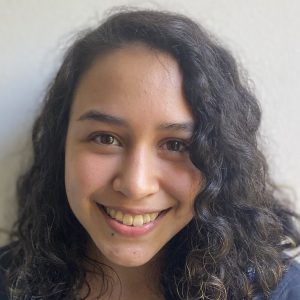
Nicole Avila
Undergraduate, The University of Chicago -

Nikita Koloskov
Undergraduate, Minerva University -

Oishee Chakrabarti
Undergraduate, The University of Chicago -

Rachna Gupta
Undergraduate, Harvard University, (Formerly: High Schooler, Illinois Mathematics and Science Academy) -

Ranya Sharma
DSI Summer Lab Research Assistant; (currently) High Schooler, Barrington High School; (incoming) Undergraduate, the University of Chicago -

Rayan Garg
Undergraduate: Cornell University (Formerly: High Schooler, Archbishop Mitty High School) -

Robert Ezra Stern
Undergraduate, The University of Chicago -
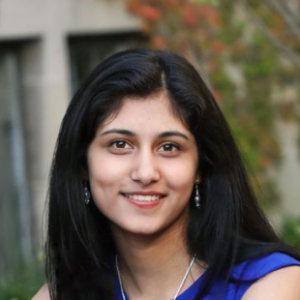
Roma Bhattacharjee
DSI Summer Lab Alum; Undergraduate, Princeton University (Formerly: University of Chicago Laboratory Schools) -
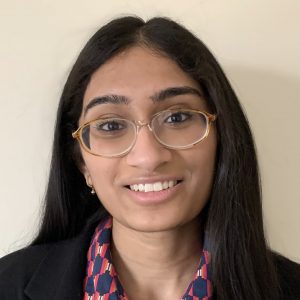
Sahithi Ankireddy
Undergraduate, California Institute of Technology (Caltech) (Formerly: High Schooler, James B. Conant High School) -

Sarah Lim
High Schooler, Lane Tech College Prep -

Sophie Xie
High Schooler, Whitney M. Young Magnet High School -

Stephen Ehumah
Undergraduate, North Central College -

Stephen Tinubu
Undergraduate, University of Illinois at Chicago (Formerly: High Schooler, Kenwood Academy High School) -

Syeda Jaisha
Masters Student, Masters Program in Computational Analysis and Public Policy, The University of Chicago -

Taig Singh
High Schooler, The University of Chicago Laboratory Schools -

Xi Cheng
Masters Student, Masters in Computational Social Sciences Program, The University of Chicago -

Yangzhou Ou
Masters Student, Masters Program in Computational Analysis and Public Policy, The University of Chicago -

Yiqiao Bao
Undergraduate, The University of Chicago -

Zoe Stephens
High Schooler: The University of Chicago Laboratory Schools
Mentor: Samantha Riesenfeld
Project Title: Learning How to Identify Noisy Features from Persistent Homology
Mentor: Samantha Riesenfeld
Project Title: Topological Features in Drug Tolerant Cells
Project Description: Using a published data set of scRNA-seq data in PC9 cells treated with Erlotinib, I used R and Python to identify characteristics of cells with prolonged treatment and acquired resistance to help learn the manifold of the data.
Mentor: Eamon Duede
Project Title: Evolution of Annoyingness
Project Description:We analyzed the time and the sentiment (as a contributing factor to the emotion of irritation) of the tweets from a data pipeline we had created using the Academic Twitter API. Leveraging Machine Learning algorithms, we found that the day of the month can be almost as predictive as the tweet content for predicting/classifying the sentiment.
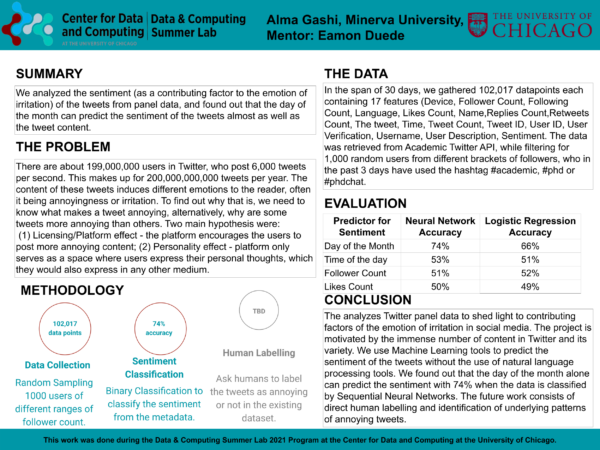
Mentor: Ravi Madduri
Project Title: Machine Learning Mobile Applications for Health Promotion
Project Description: This summer, alongside fellow cohort member Daniel Chechelnitsky, she worked with Dr. Ravi Madduri to create a mobile health app implementing machine learning models of disease prediction. Using Flutter, an open-source UI software development kit launched by Google, she designed and implemented the front-end and back-end components of the application, working with SQL databases and TensorFlowLite machine learning models among other things. The code for the final product can be found here.
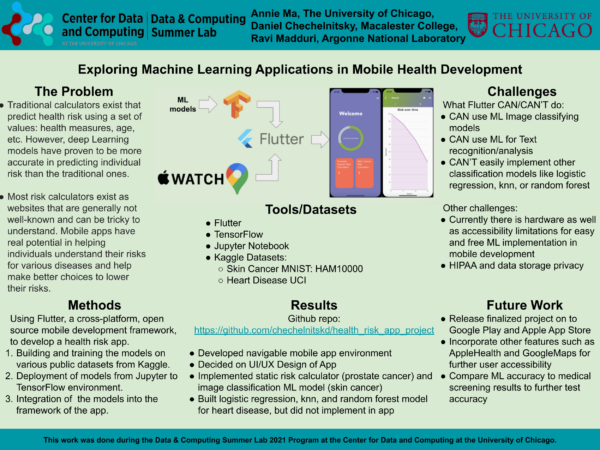
Mentor: Chenhao Tan
Project Title: AI-Driven Tutorials
Project Description: Leveraging artificial intelligence and medical imaging datasets, this project aims to create an educational tool that will help train future radiology students. I had the pleasure of contributing to the web development work (BE & FE) for this project.
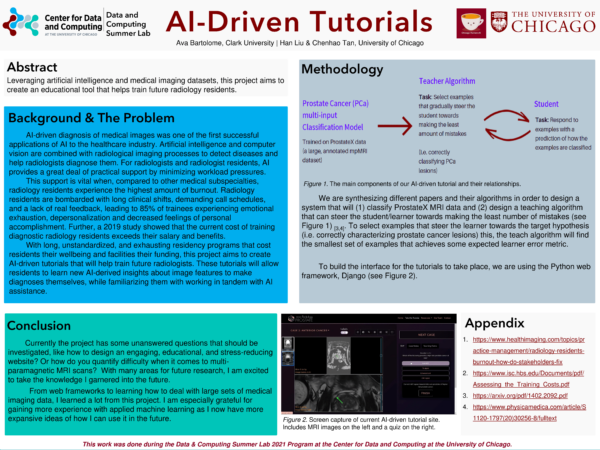
Mentors: Margaret Beale Spencer & Chris Graziul
Project Title: Analysis of Police Broadcast Audio at Scale
Project Description: With policing coming under greater scrutiny in recent years, researchers have begun to more thoroughly study the effects of contact between police and minority communities. Despite data archives of hundreds of thousands of recorded Broadcast Police Communications (BPC) being openly available to the public, a closer look at a large-scale analysis of the language of policing has remained largely unexplored. While this research is critical in understanding a “pre-reflective” notion of policing, the large quantity of data presents numerous challenges in its organization and analysis.
We conducted preliminary work toward enabling Speech Emotion Recognition (SER) in an analysis of the Chicago Police Department’s (CPD) BPC by demonstrating the pipelined creation of a datastore to enable a multimodal analysis of composed raw audio files.
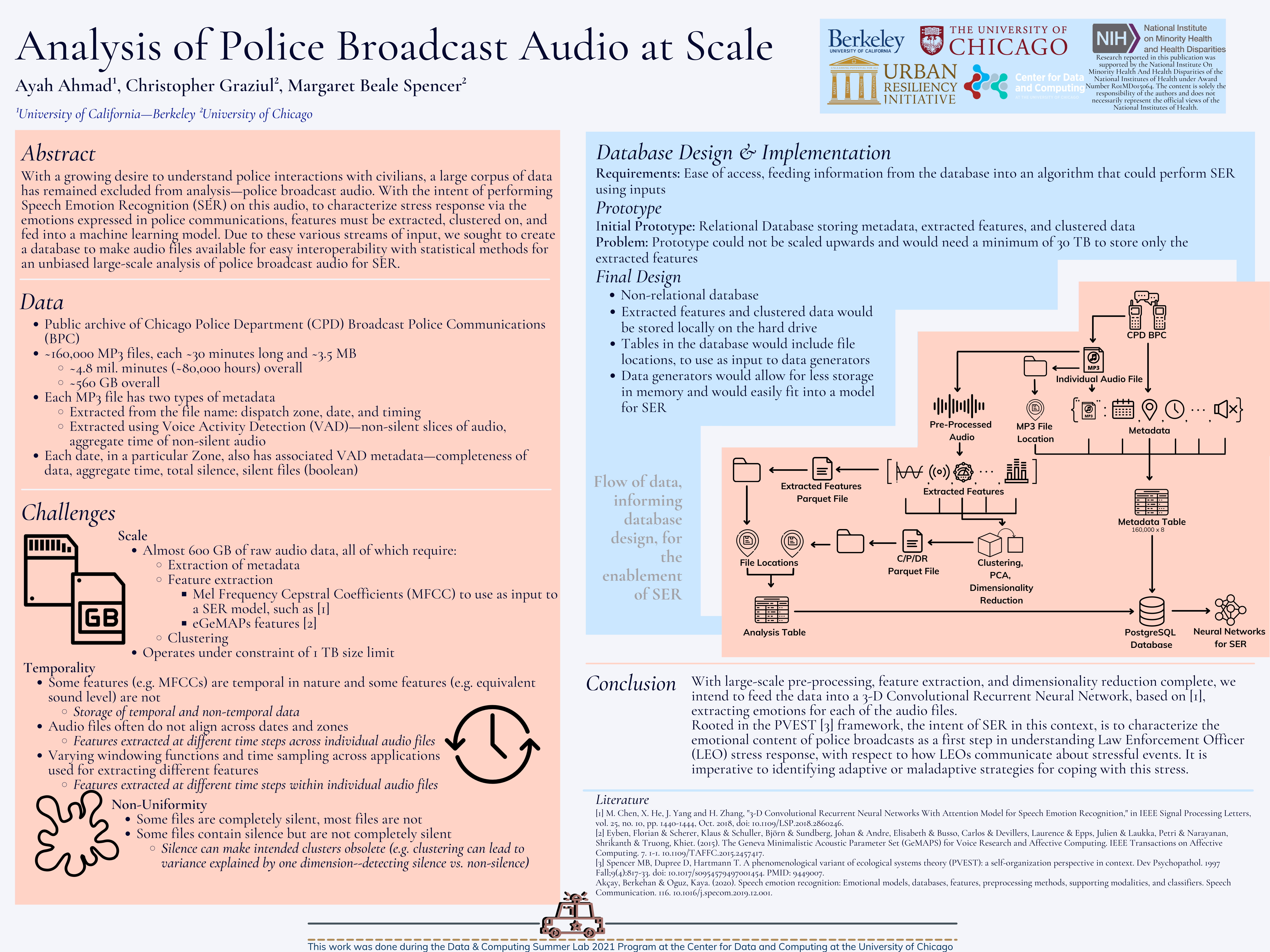
Mentors: Anjali Adukia & Teodora Szasz
Project Title: Measuring Race and Gender Representation in Children’s Books Using Sentiment Analysis
Project Description: We measured race and gender representation in award-winning children’s books using sentiment analysis. Our goal was to find the sentiment towards characters to understand how different racial groups or genders are represented in these books. Sharing our findings with teachers, librarians, and parents will help us move towards a more equitable society.
Mentor: Marshini Chetty
Project Title: Investigating Privacy Implications of Educational Technologies for School Children
Project Description: Using Google sheets and links scraped from school district websites we compiled and analyzed data on student privacy. Using Plotly and Dash we visualized our findings to be displayed on a dashboard.
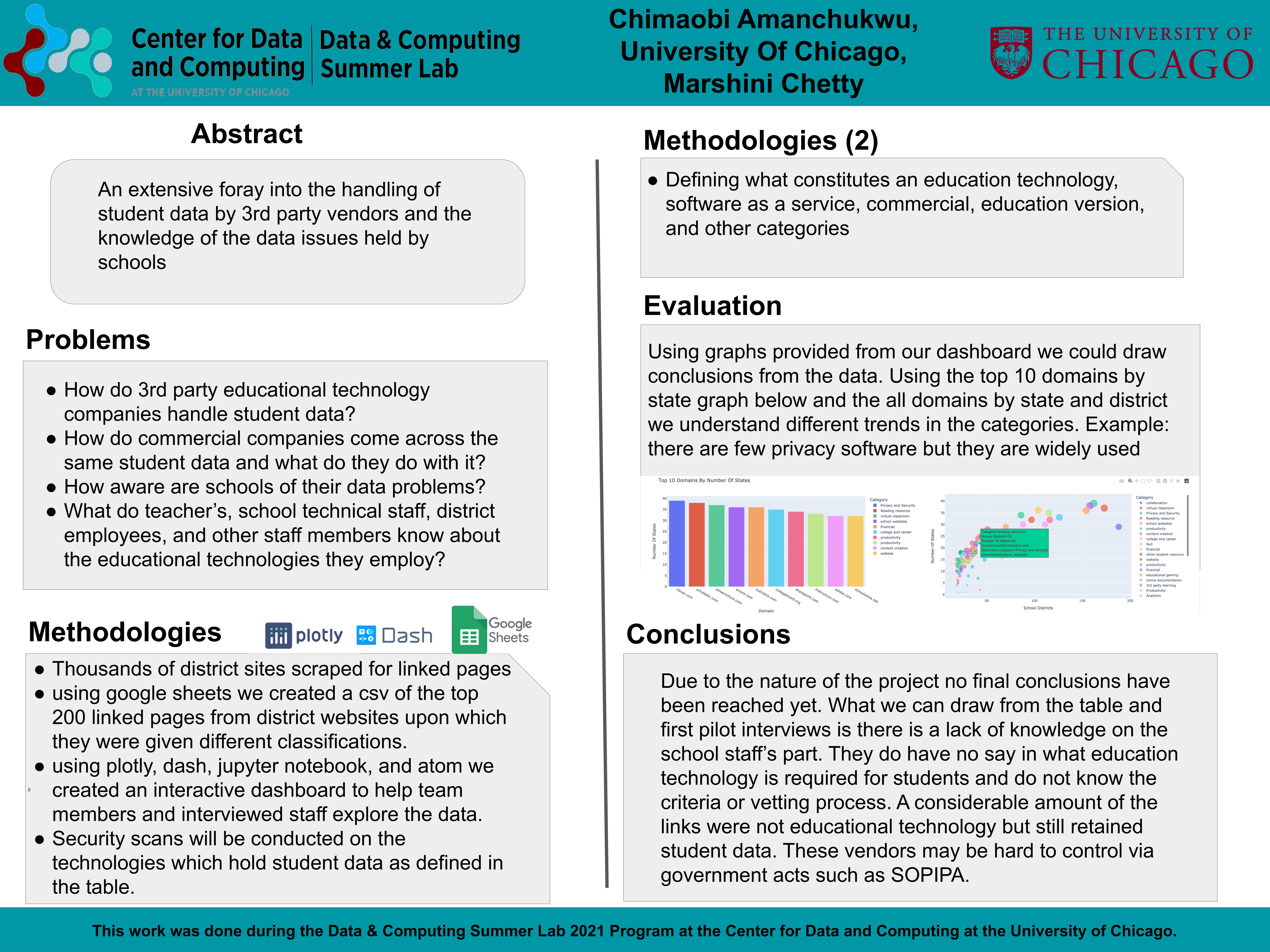
Mentors: Daniel Grzenda & David Uminsky
Project Title: Social Impact Track – Schmidt Ocean Institute, ROV Dive Processing
Project Description: In collaboration with the Schmidt Ocean Institute, our team was tasked with contributing to the foundation of an open source oceanographic video processing pipeline. Our primary goal was to implement an unsupervised video summarization model which will produce highlight reels of underwater ROV dive videos. Our secondary goal was to produce a pipeline which will tag dive video frames with informative labels using a variety of pixel-based algorithms and models.
Mentor: Ravi Madduri
Project Title: Exploring Machine Learning Applications in Mobile Health Development
Project Description: Mobile apps have real potential in helping individuals understand their risks for various diseases and help make better choices to lower their risks. Using Flutter, we developed a navigable and scalable mobile app environment, decided on UI/UX design of the app, implemented a static risk calculator (prostate cancer) and a image classification ML model (skin cancer). We also tried building and training our own regression models, but we were not able to deploy them in the Flutter framework.
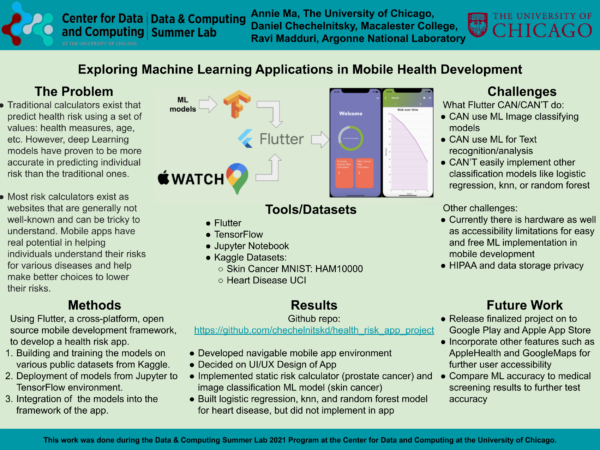
Mentor: Heather Zheng
Project Title: Exploring POV Effect for Stealthy Adversarial Patch Generation
Project Description: Facial recognition is becoming more popular nowadays, but how can we protect our privacy and prevent cameras from using images to recognize us? Using eyeware that projects light onto the face, flashing the light in a distinct pattern creates an effect called the “pov” effect, essentially making it so when cameras take an image of your face, the image will be distorted and recognition of the individual will fail.
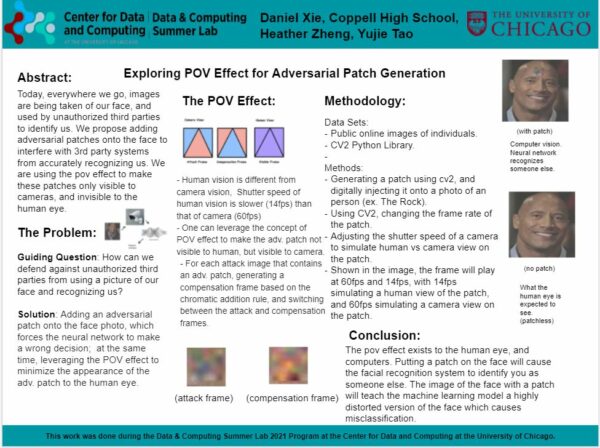
Mentors: Daniel Grzenda & David Uminsky
Project Title: Social Impact Track – Schmidt Ocean Institute, ROV Dive Processing
Project Description: The Schmidt Ocean Institute uses a remote operated robot to collect video footage of the ocean but needed ways to efficiently parse through this video. Our team developed deep learning unsupervised models to create highlight reels of the robot dives. We also used various machine learning techniques to create tags for notable aspects of the videos.
Mentor: Sarah Sebo
Project Title: Emotionally Intelligent Robots
Project Description: Developing a machine learning model to predict psychological safety and inclusion for participants of a group conversation from audio-visual data. This could be a jumping off point for social robots, to behave according to group-dynamics, and perhaps even create ways to improve those dynamics.
Mentors: Daniel Grzenda & David Uminsky
Project Title: Social Impact Track – PalmWatch
Project Description: We investigate whether top-level corporate commitments to sustainability are reflected down the supply chain, focusing on Indonesian palm oil production, which has nearly quadrupled in the past decade. Combining satellite datasets on deforestation and oil palm vegetation, we modeled the risk profile of individual palm suppliers.
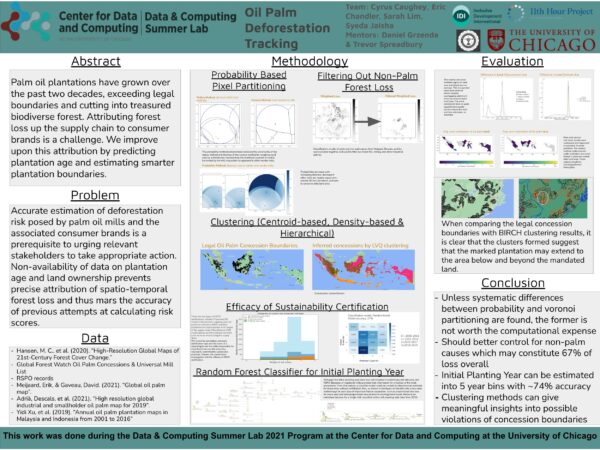
Mentors: Dylan Halpern & Julia Koschinsky
Project Title: Web Geoda Development
Project Description: WebGeoda is an open-source, fully client-side browser geospatial analysis tool that allows researchers with little to no coding experience to quickly develop and share visualizations. Built in ReactJS, it leverages the jsgeoda library to perform analysis in-browser without any server overhead costs.
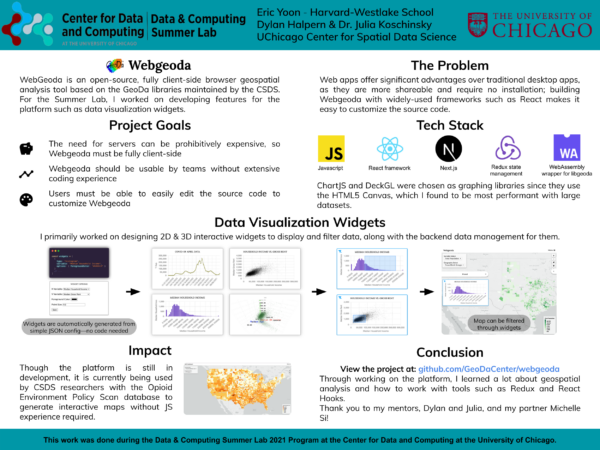
Mentors: Daniel Grzenda & David Uminsky
Project Title: Social Impact Track – Development Bank Investment Tracker
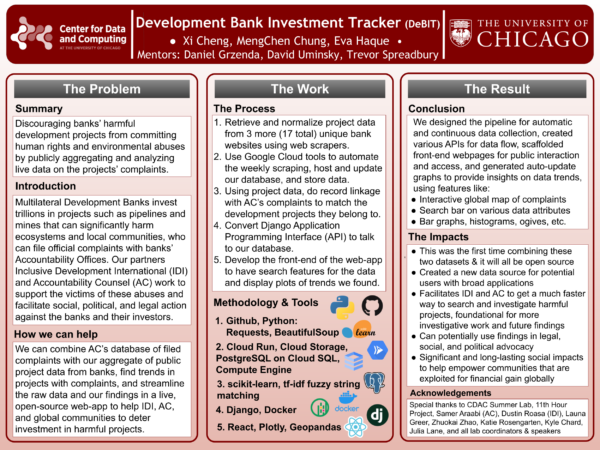
Mentors: Nick Feamster & Nicole Marwell
Project Title: Mapping and Mitigating the Digital Divide
Project Description: Building an Android app and REST API server to collect and store street-level network infrastructures’ data in AWS S3.
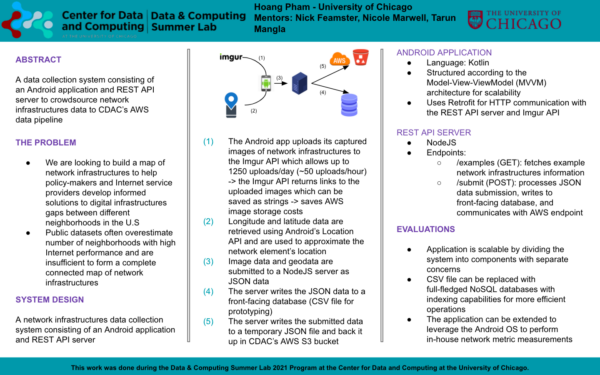
Mentors: Daniel Grzenda & David Uminsky
Project Title: Social Impact Track – Human Rights Media Analysis
Project Description: Working with the UN Human Rights Office (UN OHCHR), my team built a feature extraction and NLP classification pipeline that categorised the credibility level of news articles on human rights incidents. In the pipeline, we used sci-kits learn, hugginface, spaCy, and gensim. The resulting pipeline will streamline the process of human rights analysis for UN analysts.
Mentors: Kate Keahey & Zhuo Zhen, Argonne National Laboratory
Project Title: Bidirectional Edge Computing Research
Project Description: Using Chameleon Cloud resources, I collected and interpreted a variety of network measurements to test possible network configurations between the edge and the cloud. Additionally, I wrote a pipeline over HTTP that allows edge devices to query machine learning models hosted in the cloud.
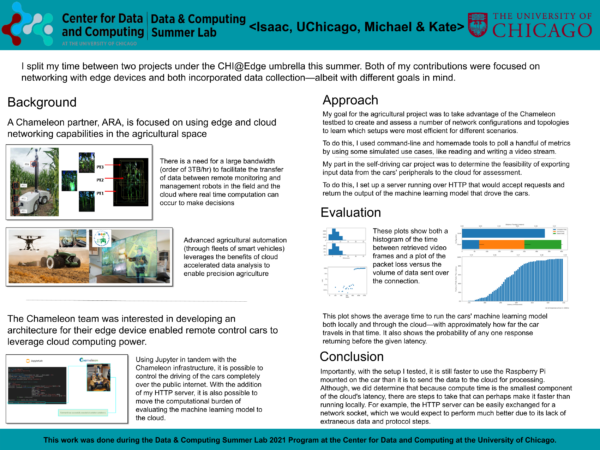
Mentors: Daniel Grzenda & David Uminsky
Project Title: Social Impact Track – Schmidt Ocean Institute, ROV Dive Processing
Mentor: Blase Ur
Project Title: Debugging Trigger Action Programming (TAP) in Smart Home Devices
Project Description: Debugging Trigger Action Programming in Smart Home Devices. Developing software to be used by non-technical participants to help them fix any issues in existing programming rules for smart home devices.
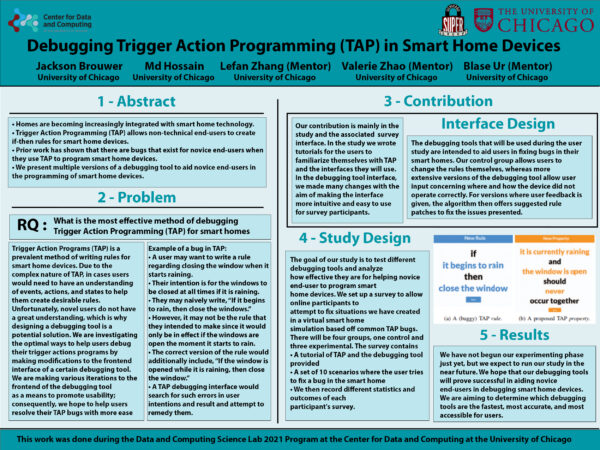
Mentor: Pedro Lopes
Project Title: Batteryless Haptics
Mentor: Sarah Sebo
Project Title: Meaningful Conversations
Mentor: Blase Ur
Project Title: Improving Data Downloads
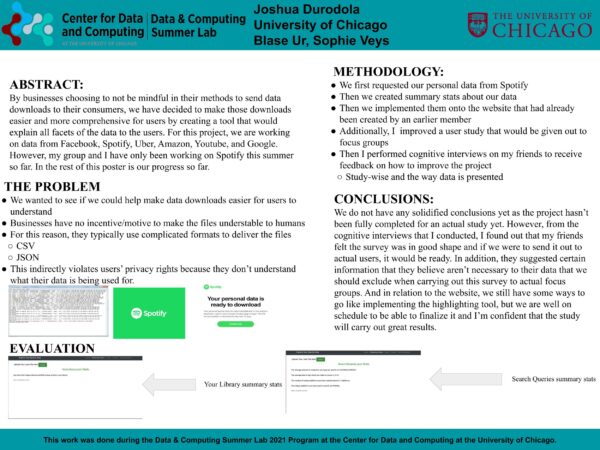
Mentor: Bryon Aragam
Project Title: Integrating Generative Models and Causal Inference with Applications in Fair Machine Learning
Mentors: Giuseppe B. Cerati & Jeremy Hewes & Daniel Grzenda
Project Title: Exa.TrkX
Project Description: I worked on the Exa.TrkX project which presents a graph neural network (GNN) technique for low-level reconstruction of neutrino interactions in a Liquid Argon Time Projection Chamber (LArTPC). Graphs describing particle interactions are formed by treating each detector hit as a node, with vertices describing the relationships between hits. The model itself is a multihead attention message passing network which performs graph convolutions in order to label each node with a particle type.
Mentor: Blase Ur
Project Title: Debugging Trigger Action Programming (TAP) in Smart Home Devices
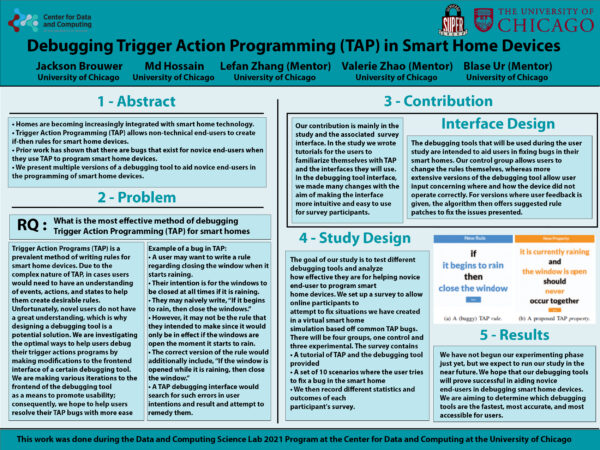
Mentor: Pedro Lopes
Project Title: InterventionEMS
Mentors: Daniel Grzenda & David Uminsky
Project Title: Social Impact Track – Development Bank Investment Tracker
Project Description: Analyzed relationship between development bank investments and local complaints, facilitating financing processes and protecting human and environmental rights using data engineering and machine learning; Built automatic and continuous investment data collection mechanism with Google Cloud, created SQL database and APIs for data flow, scaffolded front-end webpages for public access, and generated auto-update graphs to provide insights on data trends.
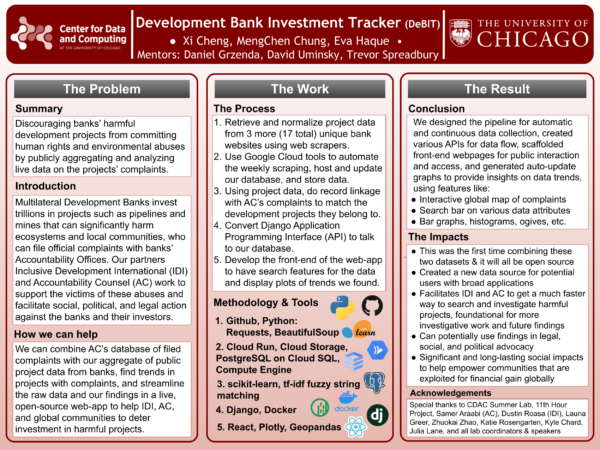
Mentor: Brian Nord
Project Title: Deep Diagnostics of Convolutional Neural Networks
Project Description: My project focused on how to efficiently access fundamental diagnostics to train and optimize CNN’s. I investigated multiple diagnostics programs to determine how they function to help evaluate model performance. However, Testing these diagnostic tools supported my initial hypothesis that these programs didn’t offer easy access to the fundamental diagnostics of a model I was looking for. So I built a diagnostic package that cuts out extraneous features, and with those, the need for external resources or a deep knowledge of coding to provide new and inexperienced users with the fundamental diagnostics they need.
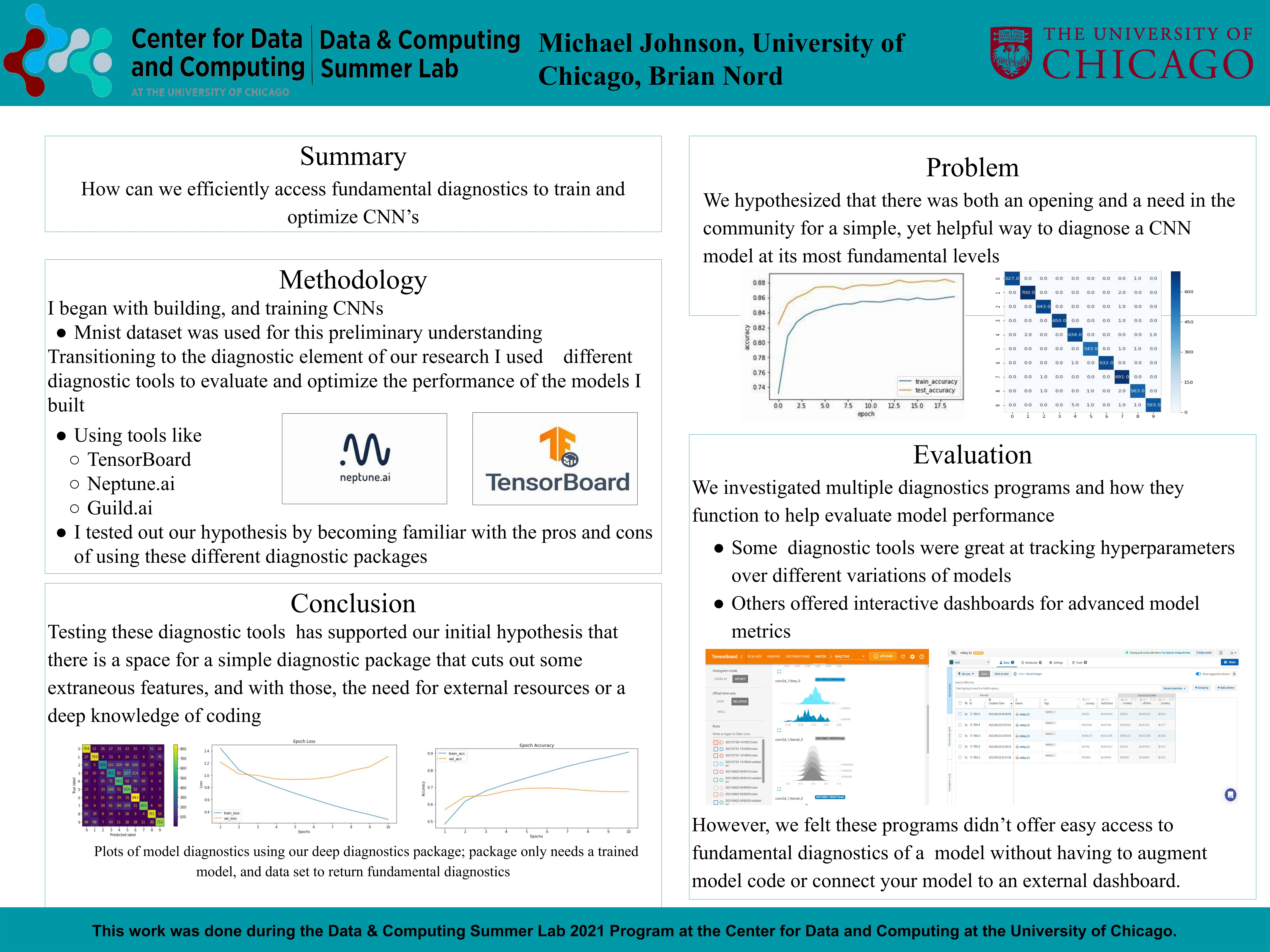
Mentor: Jai Yu
Project Title: Behavior Modeling in Rats
Mentors: Dylan Halpern & Julia Koschinsky
Project Title: In-Browser Spatial Analytics: Observable Notebook + WebGeoda Scaffolding
Project Description: This summer, I contributed to the creation of in-browser spatial analytics tools, which improve shareability and flexibility of geospatial research. With ObservableHQ, a Javascript environment, I built an interactive tutorial for exploring local spatial autocorrelation, a key concept in spatial econometrics. I also worked on WebGeoda, a browser version of Luc Anselin’s desktop GeoDa app, by creating various data analysis widgets for spatial autocorrelation.
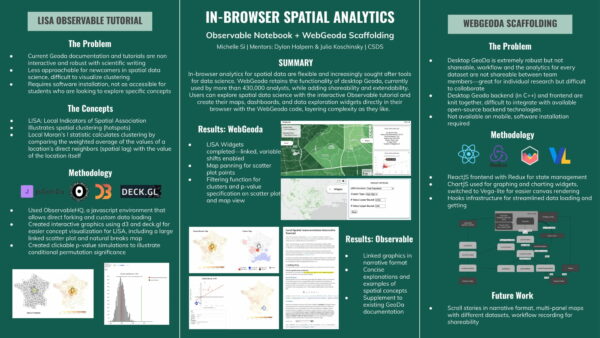
Mentors: Kyle Chard, Matt Baughman
Project Title: AWS Spot Market Trends from 2018 and 2021
Project Description: In late 2017, Amazon changed the spot market algorithm with the aim of decreasing price variability, increasing spot instance durability, and regularizing the market (Baughman et al, 2019). These changes have made it impossible to rely on the previous strategy of using supply and demand to make decisions. Our research looks at 2021 spot market prices and comparing them to 2018 and compare findings to results found in Deconstructing the 2017 Changes to AWS Spot Market.
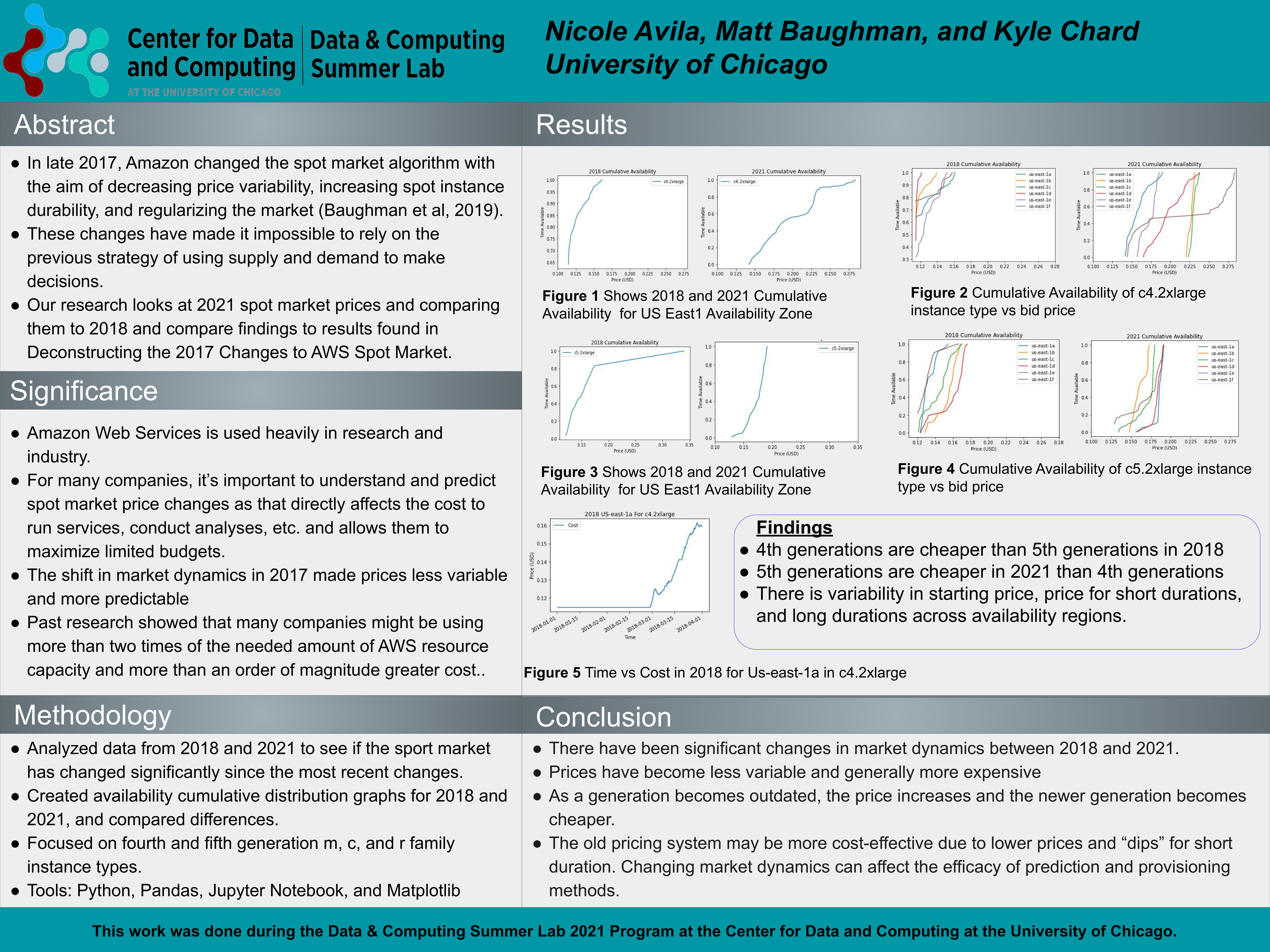
Mentors: Giuseppe B. Cerati & Jeremy Hewes & Daniel Grzenda
Project Title: Exa.TrkX: Improving Graph Neural Network Performance for Classifying Neutrino Interactions in MicroBooNE Data
Project Description: The Exa.TrkX project presents a graph neural network (GNN) technique for low-level reconstruction of neutrino interactions in a Liquid Argon Time Projection Chamber (LArTPC). We discovered that the GNN model trained on DUNE simulation data performs quite poorly on the data from another neutrino detection experiment (MicroBooNE). After my colleague Kaushal modified the model architecture that allowed to detach the physical meaning from neutrino interaction graph edges, I explored new edge-forming techniques (such as Delaunay triangulation, KNN-graph, and radius graph) and retrained the model on MicroBooNE data, which resulted in 80% classification accuracy for physically meaningful interactions.
Mentor: Junchen Jiang
Project Title: Quality of Experience Personalization Project
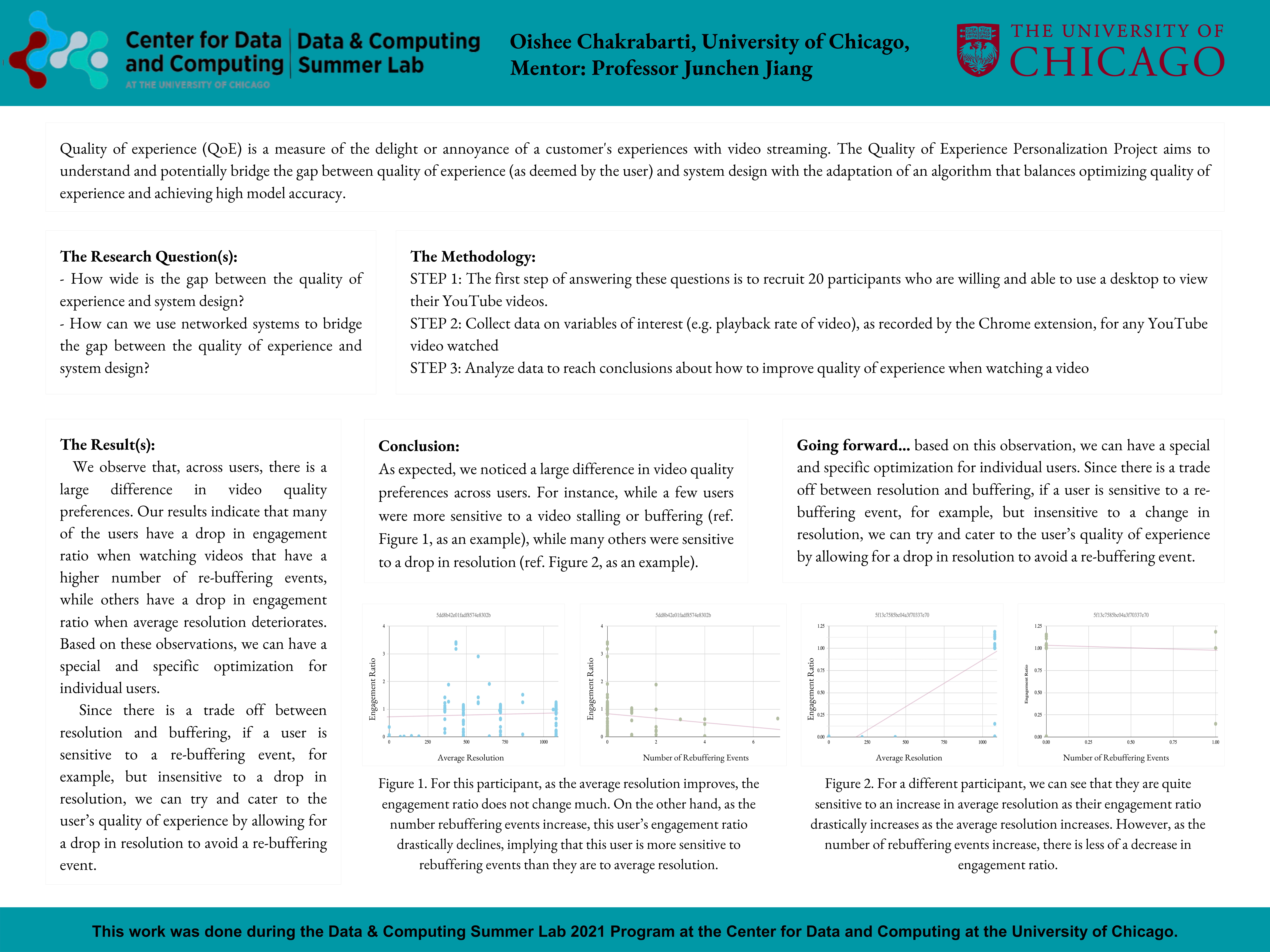
Mentors: Jean-Baptiste Reynier & Anna Woodard, Olopade Lab
Project Title: Self-Supervised Deep Learning for Breast Cancer Risk Prediction
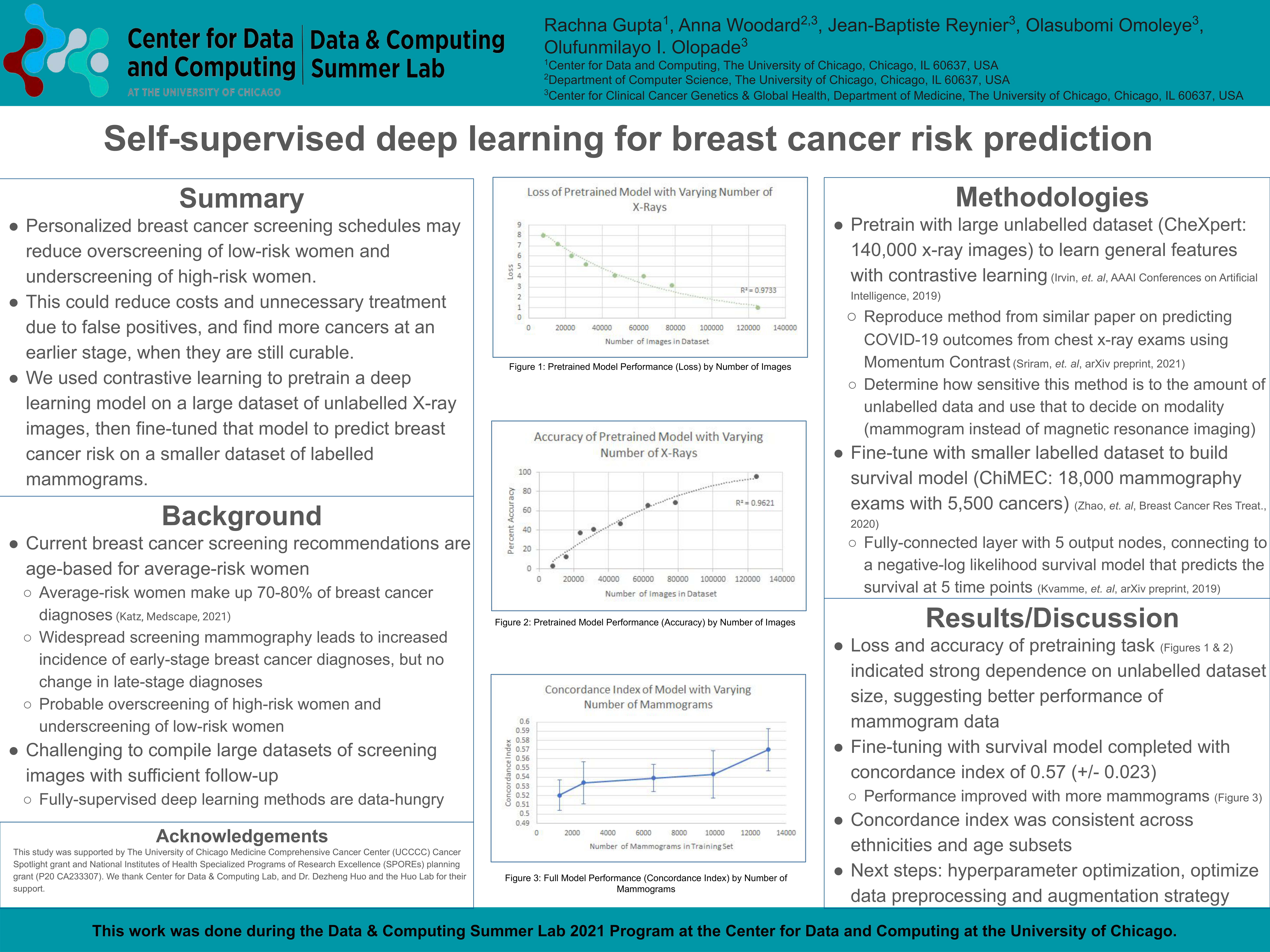
Mentor: Nicholas Marchio
Project Title: Interactively Mapping Urban Human Development
Project Description: We studied the deployment of encrypted DNS outside of the mainstream resolvers by measuring DNS query response times and ping times for resolvers located across the world. We compared non-mainstream resolvers to mainstream resolvers, such as Google and Cloudflare, to better understand the reliability of the lesser known resolvers and the DNS encrypted ecosystem as a whole.
Mentor: Ben Zhao
Project Title: Finding Physical Backdoors in Existing Datasets
Project Description: Roma Bhattacharjee is a freshman at Princeton University. This summer, she worked with Professor Ben Zhao and Emily Wenger on a project regarding physical backdoor attacks in computer vision models. She developed an automated process using graph analysis techniques to uncover viable physical triggers in pre-existing object datasets for training backdoored models.
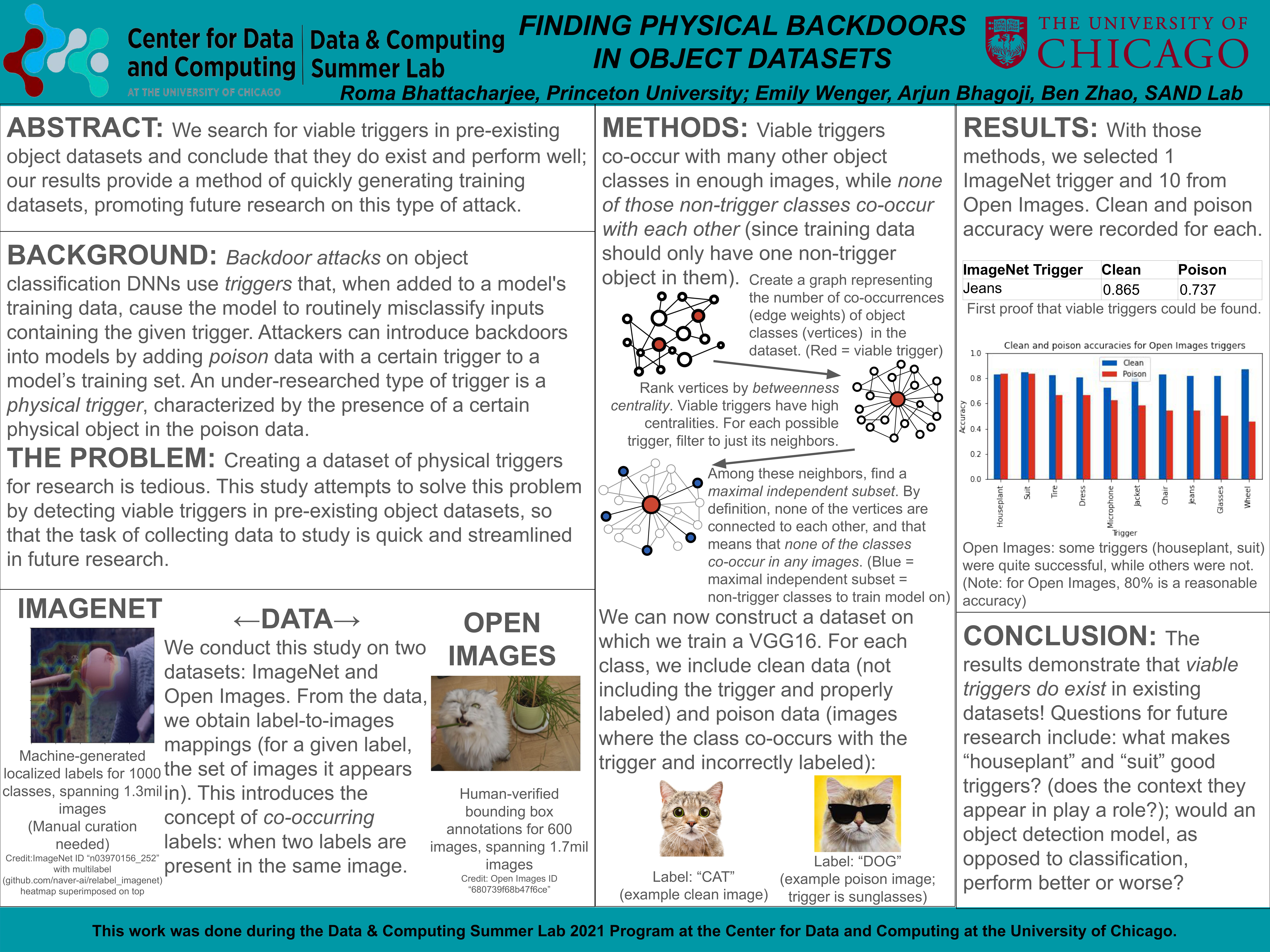
Mentors: Kate Keahey & Zhuo Zhen, Argonne National Laboratory
Project Title: Driving Autonomous Cars From Edge to Cloud with CHI@Edge
Project Description: We created a cloud-based pipeline for driving autonomous cars via Chameleon’s CHI@edge testbed. Specifically, we developed base containers with libraries for access to a car’s interfaces and launched them onboard small, remote-control cars in addition to exploring the effect of different machine learning models on the performance of the car.
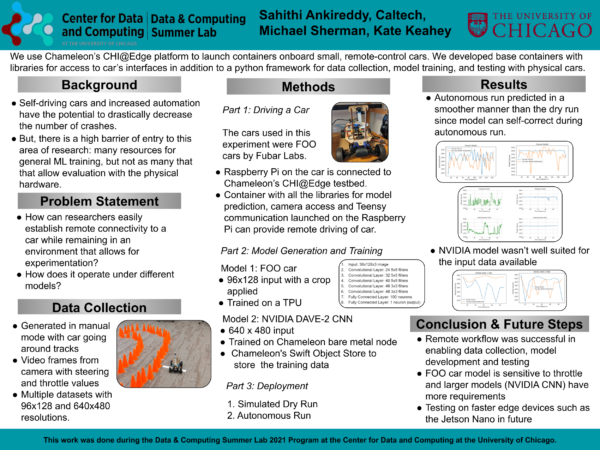
Mentors: Daniel Grzenda & David Uminsky
Project Title: Social Impact Track – PalmWatch
Project Description: Built a model in Jupyter Lab that compares correlations between columns of risk scores,
created an overlaid histogram of risk scores per mill type, found the risk scores for mills from 2001-2019 using a function, found the year each mill was certified and used this certification column and the risk score columns to build a random forest. The Random Forest predicts for every single year whether or not mills are certified. I also built a logistic regression to predicts what type of certification they have, if they are not certified or certified.
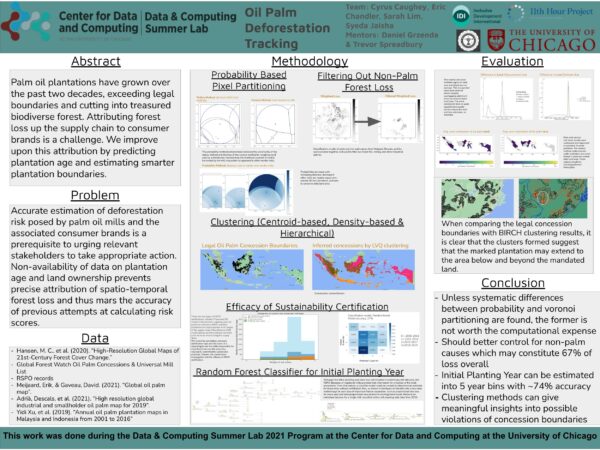
Mentor: Shan Lu
Project Title: An IDE Plugin for Machine Learning Software Testing
Project Description: This project is about the creation of a tool that helps developers use Machine Learning Cloud APIs correctly and more efficiently. The tool automatically generates test cases to thoroughly test an application’s use of Machine Learning Cloud APIs and identify many previously unknown inefficiencies or bugs.
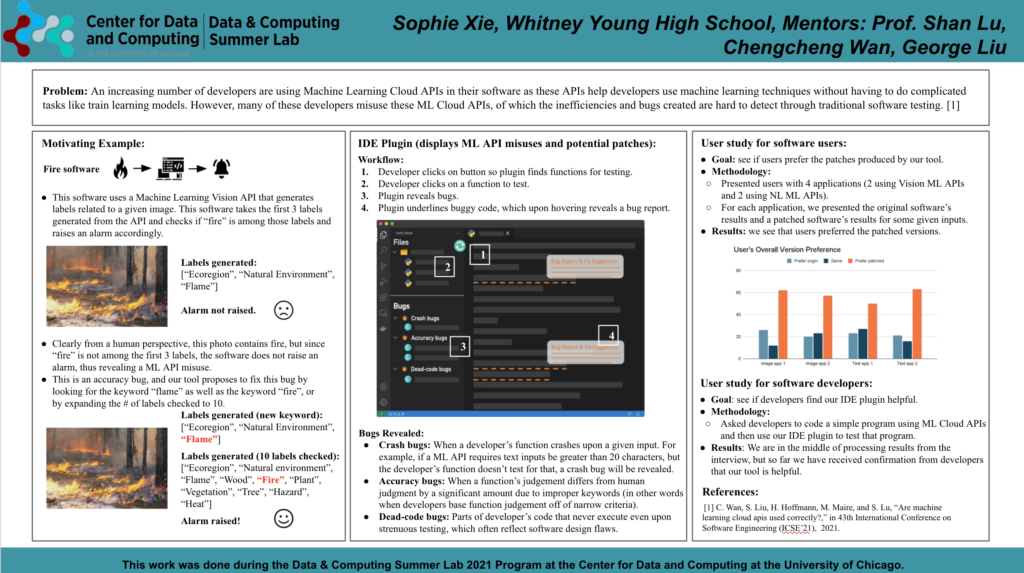
Mentors: Daniel Grzenda & David Uminsky
Project Title: Social Impact Track – Human Rights Media Analysis
Project Description: The ongoing pandemic disrupted the UN’s Office of Human Rights’ ability to conduct field monitoring, leading them to identify human rights incidents from news media. We implemented a Human Rights Media Analysis software tool which automates much of the early stages of data processing for the UNOHCHR. Our tool extracts features from a human rights report/news article and assigns a credibility score (low, medium or high) to the article.
Mentors: Nick Feamster, Nicole Marwell, Guilherme Martins & Kyle MacMillan
Project Title: Combating the Digital Divide
Project Description: The work included working with a team to build 100 devices. Wrote a script to automate and speed up the flashing process for devices. Built a script for querying data to find trends in the digital divide.
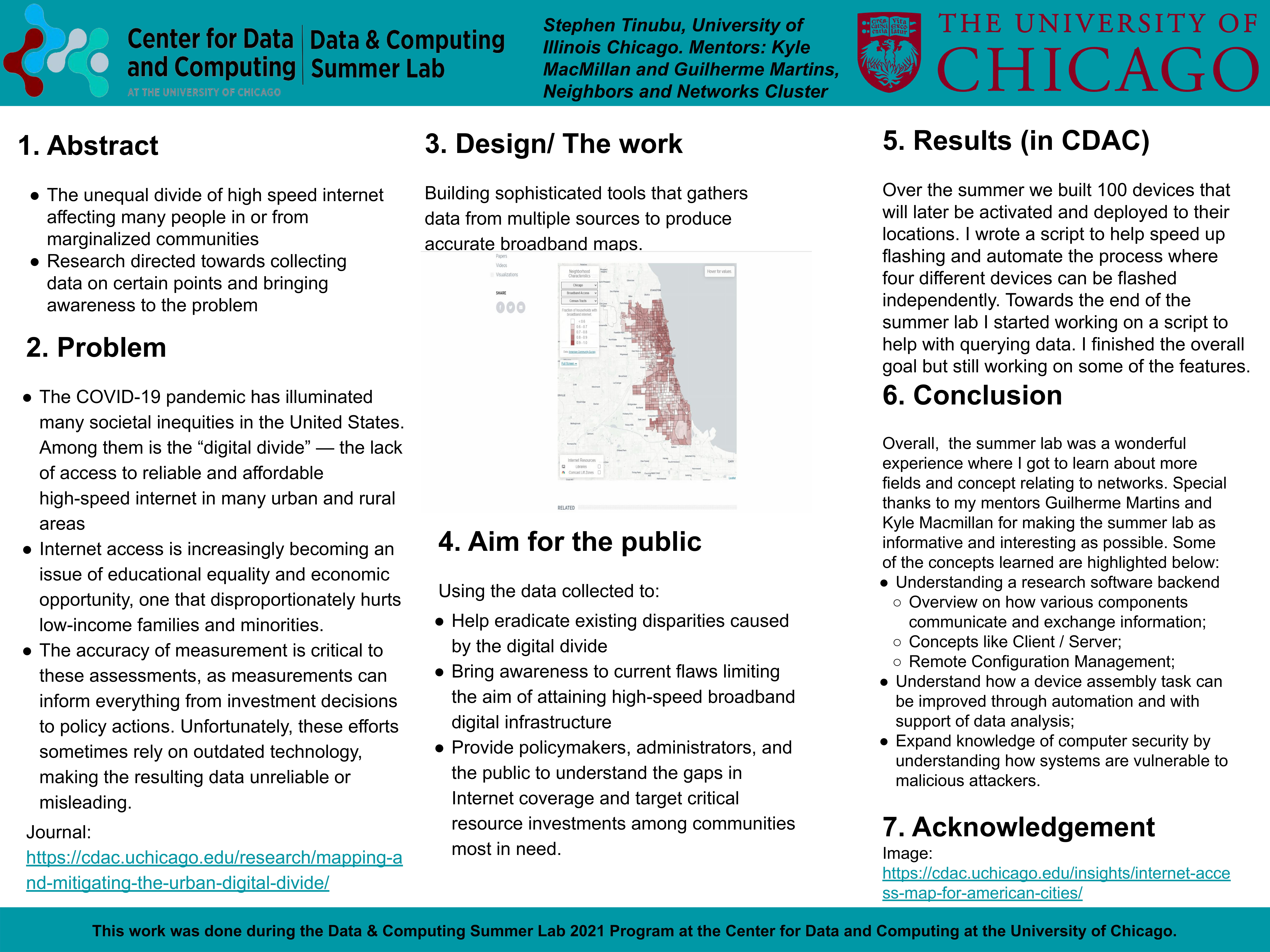
Mentors: Brian Nord & Yuxin Chen
Project Title: SPOKES: an End-to-End Simulation Facility for Spectroscopic Cosmological Surveys
Project Description: I worked under Brian D. Nord, an astrophysicist and machine learning researcher at Fermi National Accelerator Laboratory, on an open-source Python package providing an end-to-end simulation facility for spectroscopic cosmological surveys called SPOKES. SPOKES is built upon an integrated infrastructure, modular functioning organization, coherent data handling, and fast data access. SPOKES is published on PyPI at https://pypi.org/project/spokes/.
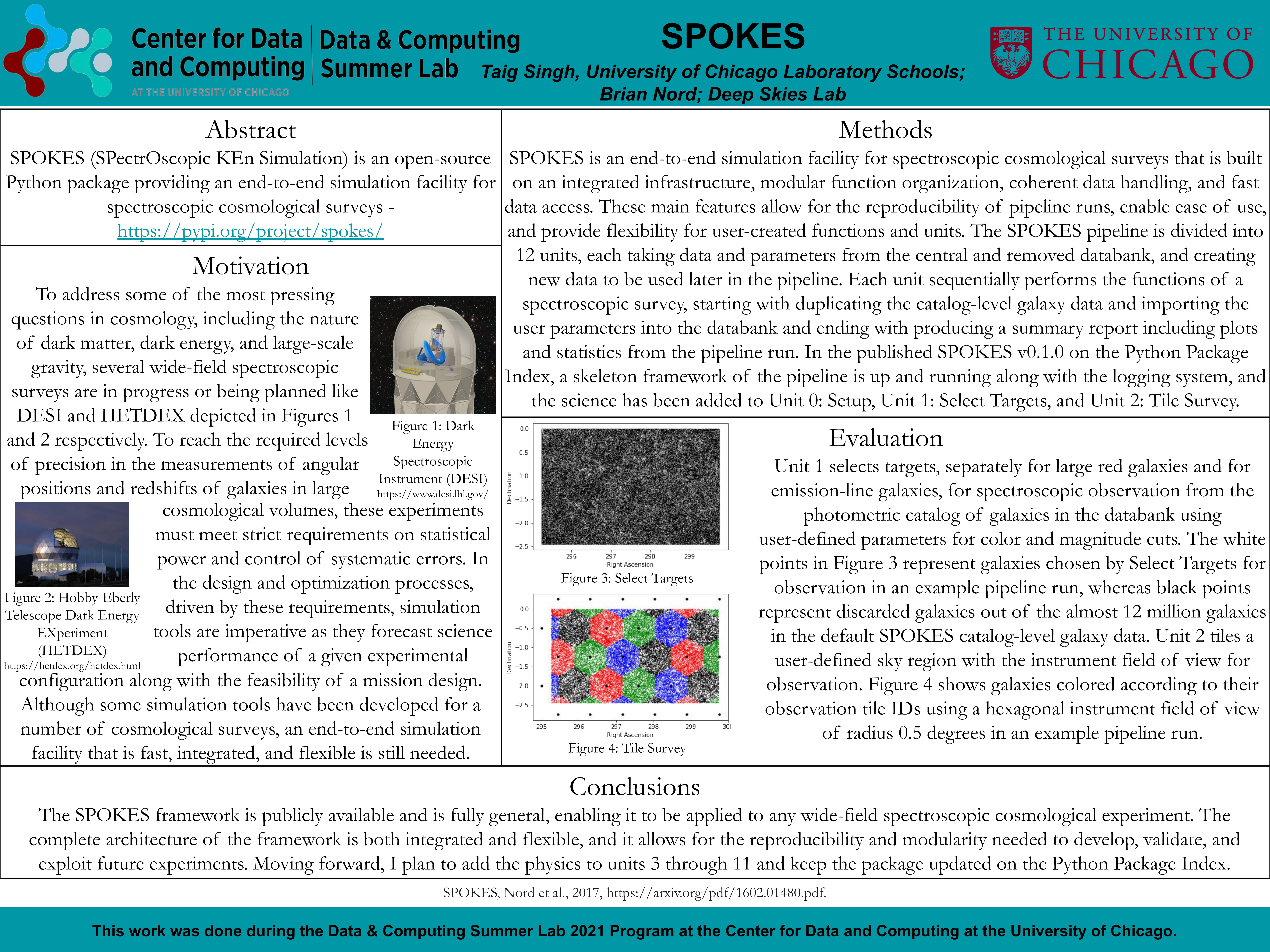
Mentors: Daniel Grzenda & David Uminsky
Project Title: Social Impact Track – Development Bank Investment Tracker
Project Description: Xi is a Research Assistant working on the Development Bank Investment Tracker (DeBIT) project to leverage data science for advancing development bank project financing and complaints tracking. Partnered with Accountability Counsel and Inclusive Development International’s Follow the Money initiative, the DeBIT project hopes to hold government, financial institutions, and corporate actors in investment projects around the world accountable for human rights violations and environmental damage.
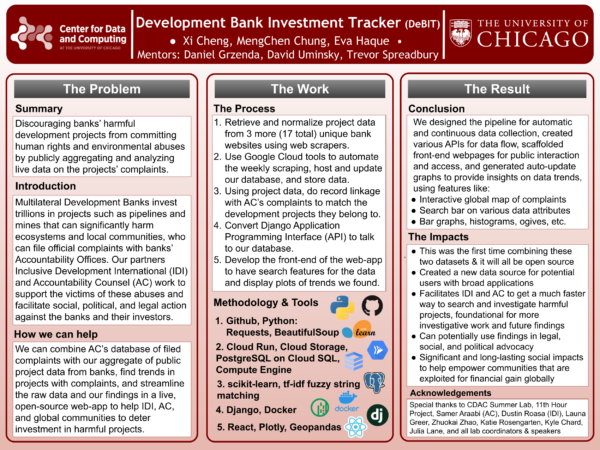
Mentors: Daniel Grzenda & David Uminsky
Project Title: Social Impact Track – Human Rights Media Analysis
Project Description: I built a data pipeline of web scraping, data cleaning and NLP analysis to develop machine learning classification models predicting the credibility of news articles for the United Nations.
Mentor: Lorenzo Orecchia
Project Title: Local Spectral Method for Graph Clustering
Project Description: Using PLINK to clean and analyze a European gene dataset with 2000 samples. Finding the associations between gene and geographical locations based on spectral graph theory.
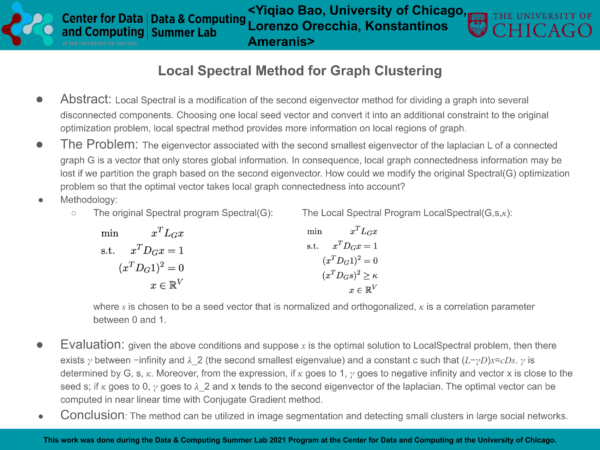
Mentor: Jai Yu
Project Title: Analyzing Rat Behavior
Project Description: I used exploratory analysis to examine rats’ behavior and choices in different mazes. Further I looked into pose analysis to pick out smaller behavioral patterns within the rats’ movements.
